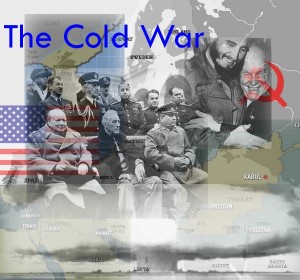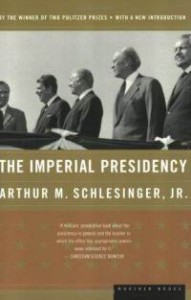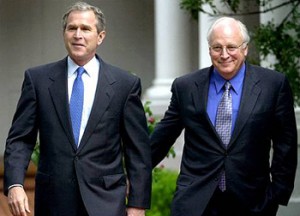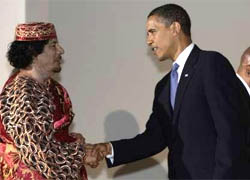 Last week Speaker of the House John Boehner (R-OH) introduced H.Res 292, which declared that President Obama “has failed to provide Congress with a compelling rationale based upon United States national security interests for current United States military activities regarding Libya,” and placed the White House under a 14-day deadline to respond to these concerns and to explain why the action is justified under the War Powers Act. The resolution passed 268-145, and was immediately denounced by the White House as “unhelpful and unnecessary.”
Last week Speaker of the House John Boehner (R-OH) introduced H.Res 292, which declared that President Obama “has failed to provide Congress with a compelling rationale based upon United States national security interests for current United States military activities regarding Libya,” and placed the White House under a 14-day deadline to respond to these concerns and to explain why the action is justified under the War Powers Act. The resolution passed 268-145, and was immediately denounced by the White House as “unhelpful and unnecessary.”
On its face, this routine—the Republican-controlled House passes a measure designed to annoy the White House, and the White House responds with annoyance—is not particularly unusual these days. In this case, though, the back-story is much more interesting. The original impetus came not from Republicans, but from liberal activist Rep. Dennis Kucinich (D-OH), whose resolution calling on President Obama to withdraw troops from Libya within two weeks and accept other restrictions forced Boehner’s hand. The House rejected Kucinich’s more forceful resolution, but just as many Democrats joined in supporting H.Res 292, many Republicans, especially Tea Party icons Ron Paul (R-TX) and Michelle Bachman (R-MI), voted for it, and Boehner himself realized that the House needed to put together some sort of resolution.
 The real issue here goes beyond the immediate politics of the day. It is decades old, and it relates to the ways that the Cold War destroyed the constitutional balance between the Executive and Legislative branch. The Constitution clearly says that only Congress has the power to declare war, but the Executive has control over foreign policy.
The real issue here goes beyond the immediate politics of the day. It is decades old, and it relates to the ways that the Cold War destroyed the constitutional balance between the Executive and Legislative branch. The Constitution clearly says that only Congress has the power to declare war, but the Executive has control over foreign policy.
The permanent emergency of the Cold War, with troops stationed overseas, intermittent crises requiring fast action, and Congress members unwilling to appear weak on national security, all tipped the balance very far in favor of the President. Added to this was the President’s ultimate control over the nation’s nuclear forces (what Garry Wills has called his “Bomb Power”), which made both Congress and the concept of declaring war appear essentially irrelevant. Encouraged by a broad bipartisan consensus in favor of containment, the US Empire grew exponentially after 1945, and with it an increasingly imperial presidency.
The War Powers Act of 1973, a response to Vietnam, was supposed to restore the balance by recognizing that presidents might need to commit forces in an emergency but also placing limits on how and for how long the president can do so without seeking congressional authorization. In the nearly four decades since, however, presidents of both parties have found ways around the restrictions of the Act. Continuing to ignore the constitutional requirement for a declaration of war, they have relied upon vague resolutions granting power to the president to deal with a crisis. Instead of strongly asserting its constitutional role, Congress has usually been stampeded into approving such resolutions by a combination of military faits accomplis, partisanship, public patriotism, and a desire to change the subject. All this despite the fact that the hastily and nearly unanimously passed Gulf of Tonkin Resolution of August 1964, which gave President Johnson unlimited authorization for war in Vietnam, should have taught us all a lesson.
 The problem with the imperial presidency is that people usually only mind when it is the other party who is practicing it. Many if not all RP readers will remember George W. Bush proclaiming his desire for a “humble foreign policy” during the 2000 campaign, or congressional Republicans alternately attacking and mocking the Clinton administration for its interest in “nation building” in Yugoslavia and elsewhere, only to forget both of those issues when the time came to mount wars against Afghanistan and Iraq. Bigger examples lie further back than the current decade. Most famously, the author of The Imperial Presidency, Arthur Schlesinger, who had built his academic career celebrating the progressive and aggressive use of executive power when the president was named Andrew Jackson, Franklin Roosevelt, or John Kennedy, suddenly discovered the disadvantages of the strong executive when the president was named Lyndon Johnson or (gasp!) Richard Nixon. Similarly, many Democratic members of the current Congress who were not shy about criticizing the Bush Administration have kept quiet about the Obama Administration’s expansion of American activities in Afghanistan and Libya.
The problem with the imperial presidency is that people usually only mind when it is the other party who is practicing it. Many if not all RP readers will remember George W. Bush proclaiming his desire for a “humble foreign policy” during the 2000 campaign, or congressional Republicans alternately attacking and mocking the Clinton administration for its interest in “nation building” in Yugoslavia and elsewhere, only to forget both of those issues when the time came to mount wars against Afghanistan and Iraq. Bigger examples lie further back than the current decade. Most famously, the author of The Imperial Presidency, Arthur Schlesinger, who had built his academic career celebrating the progressive and aggressive use of executive power when the president was named Andrew Jackson, Franklin Roosevelt, or John Kennedy, suddenly discovered the disadvantages of the strong executive when the president was named Lyndon Johnson or (gasp!) Richard Nixon. Similarly, many Democratic members of the current Congress who were not shy about criticizing the Bush Administration have kept quiet about the Obama Administration’s expansion of American activities in Afghanistan and Libya.
Today the easy partisan connection is breaking down, as many Republicans, mostly outside of the halls of power, have rebelled against the neoconservative crusades of the Bush administration (a story that deserves a post to itself) and a lot of liberals are uncomfortable with Obama’s decisions to continue American commitments and even extend them to Libya. The fact that the very liberal Kucinich and the very conservative lawyer Bruce Fein have each called for Obama’s impeachment over Libya reflects the possibility of a new bipartisan consensus. For the debate to move into more constructive channels it will be necessary for responsible politicians and analysts of all political stripes to enter the discussion.
 It would be easy to personalize the debate over the imperial presidency, as so many critics did during the Bush years, when they focused on President Bush (or, more often, Vice President Dick Cheney or Defense Secretary Donald Rumsfeld) as the source of all evil policy. That Barack Obama, who had campaigned so hard against the foreign policy adventures of the Bush administration has found himself leading the charge into Libya should disabuse us of such easy divisions. The problem is more structural. Just as the practical problem of nuclear weapons led to the concentration of military decision-making in the hands of the President, so too the problems of the international community have intensified the focus on the Presidency. Added to this is the weakness of any structures, which would push back against the president. On Libya, for example, we see:
It would be easy to personalize the debate over the imperial presidency, as so many critics did during the Bush years, when they focused on President Bush (or, more often, Vice President Dick Cheney or Defense Secretary Donald Rumsfeld) as the source of all evil policy. That Barack Obama, who had campaigned so hard against the foreign policy adventures of the Bush administration has found himself leading the charge into Libya should disabuse us of such easy divisions. The problem is more structural. Just as the practical problem of nuclear weapons led to the concentration of military decision-making in the hands of the President, so too the problems of the international community have intensified the focus on the Presidency. Added to this is the weakness of any structures, which would push back against the president. On Libya, for example, we see:
- A Congress that showed little taste for mature discussions of foreign policy, dominated by new elements that almost completely focused on domestic affairs. Congressional Democrats are handcuffed by their desire to support the White House as much as possible, which is a common problem for the party that holds the White House. With the House in Republican hands, and eager to play the role of vocal opposition, it would be useful if the Republicans had a clear position on foreign policy and a clearly identifiable spokesperson. They do not, and the situation will not improve over the course of the presidential campaign as individual candidates freelance in their search for short-term rhetorical points.
- European allies who led the rhetorical charge for action in Libya, but did not possess the means to carry through the policy on their own, and thus had to push and pull the President into it.
- A UN that is so hobbled by disagreements among the states that should have the greatest stake in international stability that it is considered a major triumph of diplomacy when the two biggest international free riders, Russia and China, choose to abstain and be useless rather than be actively obstructionist.
Is it a surprise in such a situation when those elements of the Obama administration the most clear in their support for action in Libya got their way?
In debates about American foreign commitments, national interest is often thrown around as the ideal sole guiding principle of foreign policy, as if that would automatically reduce overseas commitments. I do not disagree that national interest should weigh more heavily in decision making than abstract and open-ended notions of, say, spreading democracy. But the national interests of the largest economy in the world are broad indeed. To pretend that an emphasis on national interest will allow the US to stand back and let a strategically important area of the world fall into chaos is a dangerous fantasy. A laissez-faire foreign policy certainly has its appeals. In Libya, for example, the argument could be to allow the situation to take its course. That would reduce current commitments, though the example of Afghanistan between 1989 and 2001 suggests that ignoring a collapsing state can lead to bigger problems down the road. Sometimes an ounce of prevention (early intervention) is truly better than a pound of cure (a ten-plus year occupation).
 The point here is not to absolve the Obama administration of its sins in beginning the Libya operation, or to defend the imperial presidency, but to help us see the true nature of the current problem. The imperial presidency did not emerge from the machinations of some evil conspiracy, but step by step from the combination of definitions of interest and the current structures and practices of domestic and international politics. Americans might not like to admit it, but the US is a global power with global—and, yes, imperial—interests. To climb down from that position will require a mature discussion about our foreign policy that goes beyond particular debates about one commitment or one election cycle. It will require an honest assessment of the responsibilities of Congress and the White House, and also an honest debate about the sharing of power among the powerful states of the globe.
The point here is not to absolve the Obama administration of its sins in beginning the Libya operation, or to defend the imperial presidency, but to help us see the true nature of the current problem. The imperial presidency did not emerge from the machinations of some evil conspiracy, but step by step from the combination of definitions of interest and the current structures and practices of domestic and international politics. Americans might not like to admit it, but the US is a global power with global—and, yes, imperial—interests. To climb down from that position will require a mature discussion about our foreign policy that goes beyond particular debates about one commitment or one election cycle. It will require an honest assessment of the responsibilities of Congress and the White House, and also an honest debate about the sharing of power among the powerful states of the globe.
Considering our budgetary realities as well as the profound power shift underway across the globe, the time has indeed come for the United States to move away from its imperial habits. But if the United States decides that it no longer wants to try to lead the world, are Americans prepared to see that world led by someone else, or at least to accept the existence of partners of equal stature? Are overseas critics of American unilateralism really willing and able to play a more active role in dealing with international crises? If Congress wants to participate in foreign policy decisions, are members of both parties prepared to discuss difficult questions without constantly succumbing to the temptation to run to the nearest television camera or tape recorder to engage in partisan one-upmanship?
Those are very big questions, much easier to ask than to answer. But thoughtful people inside and outside the United States must confront them if we do not want to be stuck with the imperial presidency forever. And if thoughtful, responsible people avoid these questions because they are too hard, and the US continues its path of imperial overstretch, the fault, as one early critic of imperial executives once said, will not lie in our stars, but in ourselves.









Leave a Reply